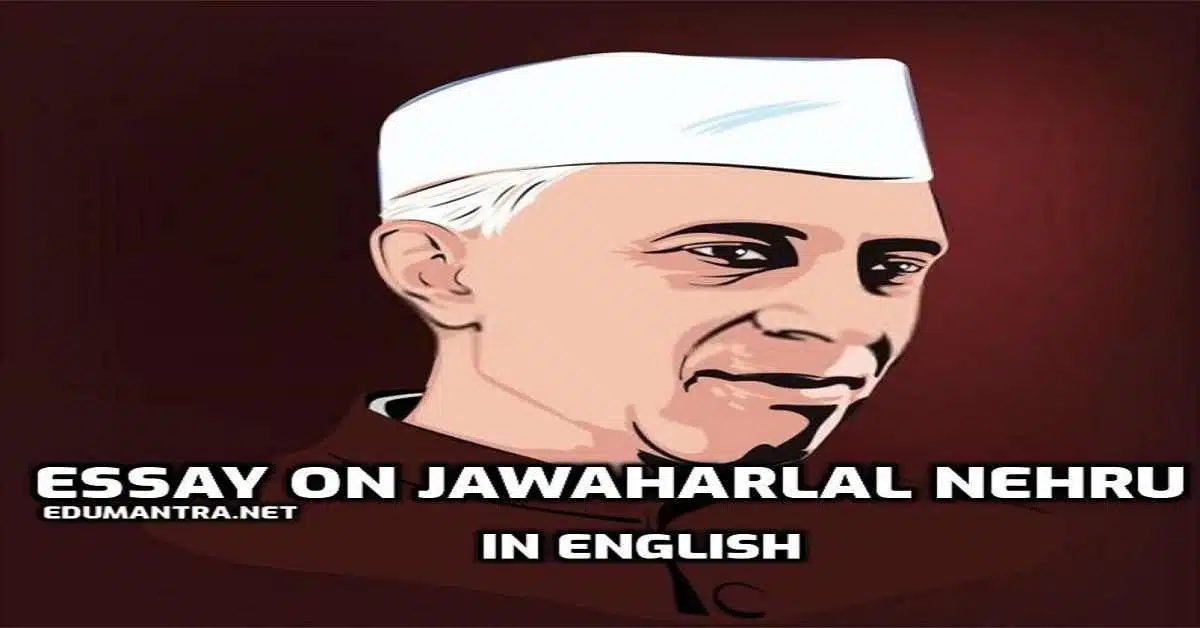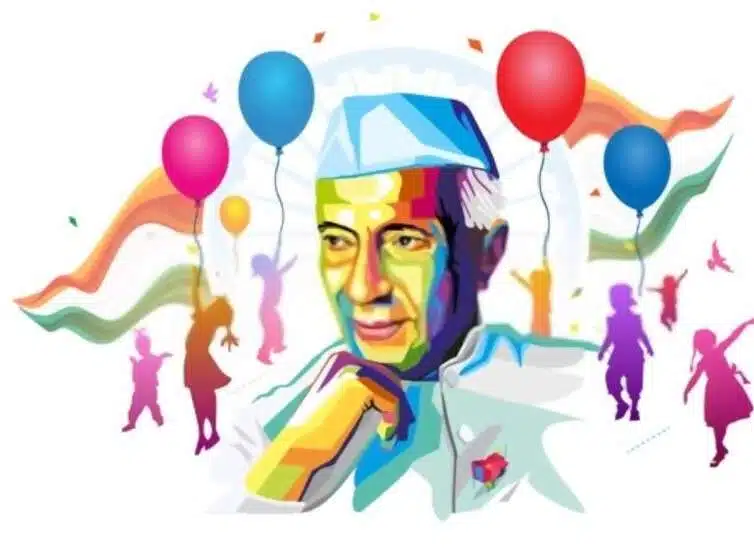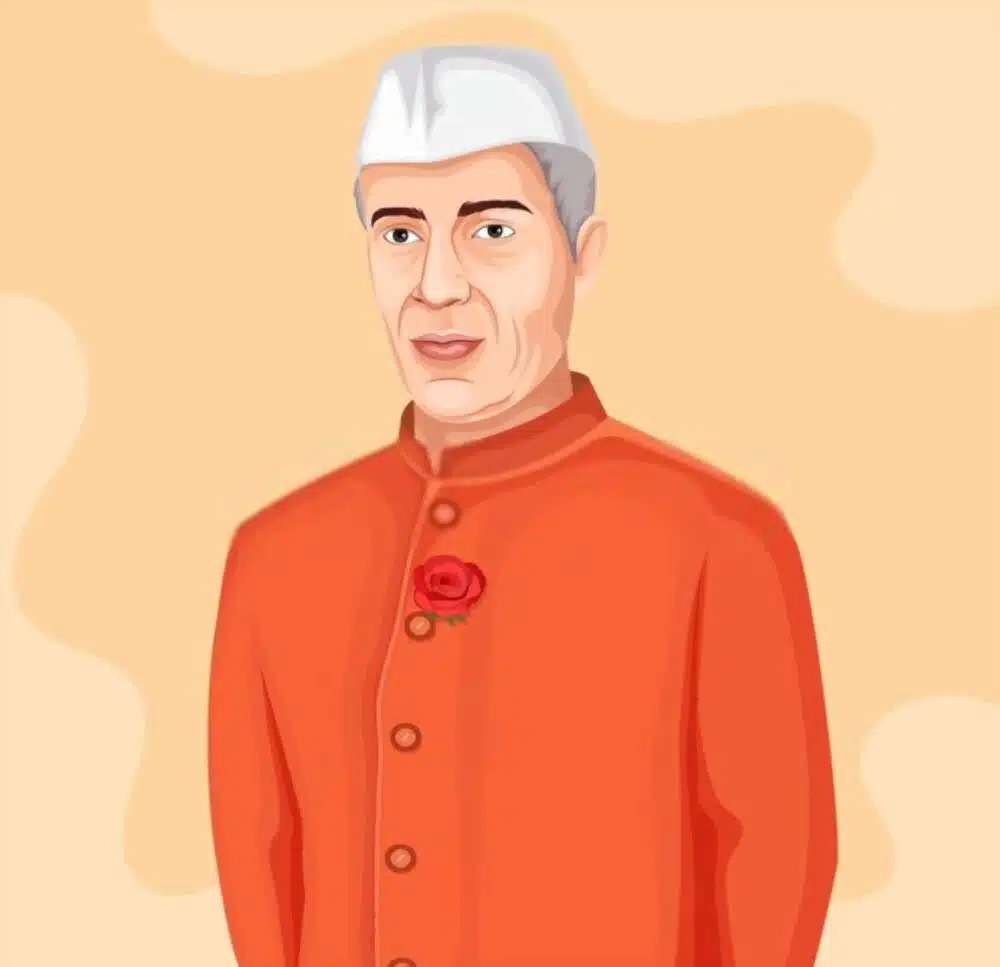
Let’s move on a journey through the following short and long essays. We will dive into the life and legacy of Jawaharlal Nehru, a towering figure in Indian politics. In this blog post, we’ll navigate through concise yet insightful essays, ranging from 100 to 400+ words, offering a remarkable journey of Jawaharlal Nehru in English.
Essay on Jawahar Lal Nehru in English – 100 Words
Jawaharlal Nehru was India’s first Prime Minister. He was a wise leader. He loved children. He was known as “Chacha Nehru,”. He worked for a free India and believed in peace. With his red rose and kind smile, he inspired us all. Nehru dreamed of schools and hospitals for everyone. He wrote books for children, urging us to dream big. His love for freedom and education makes him our hero. In a world of hope, Nehru’s vision shines like a guiding star. He taught us to be kind, learn, and build a bright future for our country.
Also Read:
- Essay on How I Spent My Summer Vacation
- A Paragraph on Water Pollution
- A Paragraph on Environment Pollution
- Paragraph on River Pollution
- Paragraph on Save Trees

Essay on Jawahar Lal Nehru in English – 150 Words
Jawaharlal Nehru, was affectionately called “Chacha Nehru,”. He was India’s first Prime Minister and a beloved leader. He became a symbol of love and peace. Nehru really wanted India to be free. He helped a lot to make it happen. He also wanted all kids to go to school and be healthy. So, he made schools and hospitals everywhere in India. Nehru wrote books for kids, telling them to have big dreams and work hard.
Chacha Nehru imagined a country where everyone is kind and knows a lot. He worked hard for freedom, democracy, and education. This made a big impact on India. Nehru’s teachings keep encouraging us to be nice, curious, and make the world better. In our hearts, he’s like a guiding light, saying that every kid’s future is full of promise and possibilities.
In the end, Nehru’s dream was simple: happy kids, good schools, and healthy people. His love for freedom and learning is like a spark. Let’s keep dreaming big, working hard, and being kind—just like Chacha Nehru wanted.
Also Read:
- Paragraph on Mahatma Gandhi in English
- Paragraph on Earth Day
- Paragraph on Gender Discrimination
- Paragraph on Life
- Amazing Paragraph on Child Labour
Essay on Jawahar Lal Nehru in English – 250 Words
Jawaharlal Nehru, often called Chacha Nehru, was a very important person in India. He was Born on November 14, 1889, in Allahabad. He became India’s first Prime Minister. Nehru was like a guiding star during the fight for freedom. His parents, Motilal Nehru and Swarup Rani Nehru, were smart and educated, and their values shaped young Nehru’s thoughts.
He learned many things at home from private tutors and then went to England for further studies at Harrow and Trinity College, Cambridge. Nehru loved languages and understood various subjects well. Western education broadened his mind and prepared him for his role as a leader.
Back in India, Nehru worked hard for the country’s progress. He dreamt of every child being educated and healthy, leading to the establishment of schools and hospitals across the nation. Nehru’s love for children earned him the affectionate title of Chacha Nehru, and he always wore a red rose, symbolizing love.
Nehru believed in freedom, democracy, and justice. He was a supporter of socialism and Fabianism, ideas that focused on fairness for all. His experiences and education made him passionate about social justice and helping people.
Jawaharlal Nehru’s legacy lives on, reminding us to dream big, work hard, and be kind. His love for freedom, education, and children continues to inspire us, making him a timeless figure in Indian history.

Essay on Jawahar Lal Nehru in English – 300 Words
1. Introduction- Pandit Jawaharlal Nehru
Pandit Jawaharlal Nehru is a well-known figure in India. He made history as the country’s first Prime Minister, serving from the time when India became independent in 1947 until he passed away in 1964. Nehru was born on November 14, 1889, in the city of Allahabad.
2. Nehru’s Education Abroad
He received his education in England, starting at Harrow School and then moving on to Trinity College, Cambridge. After completing his studies at Cambridge, Nehru went on to study law at the Inner Temple in London.
3. Influence of Mahatma Gandhi
Nehru was deeply influenced by Mahatma Gandhi’s ideas, especially the concept of non-violence. This inspiration played a significant role in his active involvement in India’s struggle to gain independence from British rule.
4. Nehru’s Affection for Children
Nehru was not just a political leader; he also had a special place in his heart for children. He was affectionately called ‘Chacha Nehru’ by kids. To honor his love for children, his birthday is celebrated as Children’s Day across India.
5. Building Modern India
Nehru was also a man of vision who laid down the edifice for modern India. Propagating in no uncertain terms the cause of democracy, secularism, and scientific growth, he inaugurated a string of institutions of higher learning in the country, which included the Indian Institutes of Technology and the All India Institute of Medical Sciences. Nehru’s foreign policy of non-alignment left a significant impact on global politics during the Cold War era.
6. Nehru as a Writer
Jawaharlal Nehru was more than just India’s first Prime Minister; he was also a passionate writer. His literary contributions include numerous works, with ‘The Discovery of India’ and ‘Glimpses of World History’ being particularly notable. These books reflect Nehru’s deep understanding and his forward-looking vision for India, showcasing his immense contribution to the nation’s intellectual heritage.
7. Foundations of Democracy and Development
Nehru’s legacy is significant, as he laid the groundwork for India’s path towards democracy and development. His leadership helped establish a solid foundation for the country’s progress in the years following independence.
8. Controversies and Criticisms
However, Nehru’s tenure was not without its controversies. One of the most debated aspects of his policy-making was his approach to the Kashmir conflict, which has been a subject of criticism over the years.
9. Nehru’s Enduring Legacy
Despite these controversies, Nehru’s role in shaping modern India is undisputed. His contributions have made him an enduring figure in the annals of Indian history, remembered for his profound impact on the country’s development.
FAQs
1.When did Jawahar Lal Nehru die?
Answer- Jawahar Lal Nehru, the first Prime Minister of India, left this world on 27th May 1964 after he suffered from a fatal heart attack.
2.What were Jawaharlal Nehru’s greatest achievements?
Here are Jawaharlal Nehru’s 5 great achievements. It is up to you which one you consider to be the greatest.
1. Leading India to Independence: Nehru’s leadership was crucial in India’s fight for freedom from British colonial rule, culminating in independence on August 15, 1947. His strategic vision and negotiations were instrumental in the peaceful transition of power.
2. Setting up Democratic Framework: As a principal contributor to the Constitution of India, Nehru established a system of governance that provided rights and freedoms to its citizens, laying the groundwork for the world’s largest democracy.
3. The Industrialization Boost: Nehru’s forward-thinking policies aimed at making India self-sufficient led to significant industrial growth. He established various industries and public sector entities, setting the stage for the country’s economic development.
4. Promotion of Scientific Research and Education: Nehru’s commitment to education and science is evident in his role in founding premier institutions like the Indian Institutes of Technology. These efforts fostered a strong culture of scientific research and innovation in India.
5. Advocating Non-Aligned Foreign Policy: Nehru’s non-alignment policy during the Cold War era ensured that India remained neutral, avoiding entanglement in the global power struggles between the US and USSR. This approach helped maintain India’s sovereignty in foreign affairs.